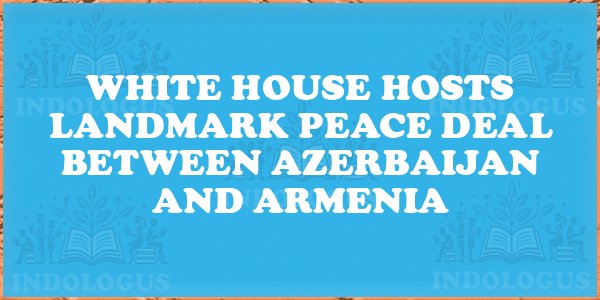Breaking news: Azerbaijan and Armenia reach a historic peace agreement at the White House with Donald Trump, ending decades of conflict over Nagorno-Karabakh.
Overview:
In a significant breakthrough, Azerbaijan and Armenia have signed a landmark peace deal at the White House, officially resolving long-standing hostilities over the disputed Nagorno-Karabakh region. The agreement, facilitated by US President Donald Trump, aims to bring an end to fighting, promote trade, travel, and establish diplomatic relations between the two nations.
Background of the Conflict:
- The conflict between Azerbaijan and Armenia dates back to the late 1980s and early 1990s, primarily centered around the Nagorno-Karabakh region.
- Despite a 1994 ceasefire, sporadic violence continued over the years, with recent clashes occurring in the early 2020s.
- The Nakhchivan corridor has been a key point of contention, crucial for connecting mainland Azerbaijan with its Nakhchivan exclave.
Key Terms of the Peace Agreement:
- A permanent end to all fighting between Azerbaijan and Armenia.
- The reopening of vital transport routes, including a new transit corridor linking Azerbaijan and Nakhchivan.
- Mutual efforts to enhance trade, travel, and diplomatic ties.
- US assistance in constructing the corridor, named the Trump Route for International Peace and Prosperity.
US Diplomacy and Geopolitical Implications:
- This peace deal signifies a significant geopolitical shift, as the US takes a leading role in resolving the conflict that was historically mediated by Russia.
- With Russia’s diminished involvement, the US-brokered agreement enhances Washington’s influence in the strategically crucial Caucasus region.
- The timing of the deal, just before Trump’s meeting with Putin in Alaska, adds a diplomatic layer to the geopolitical landscape.
Key Takeaways for Competitive Exams:
- The historic peace agreement between Azerbaijan and Armenia, facilitated by the US, marks a crucial diplomatic breakthrough in the Caucasus region.
- The deal aims to establish lasting peace, open trade routes, and enhance diplomatic relations between the two nations.
- US involvement in resolving the conflict signifies a shift in geopolitical dynamics, sidelining Russia’s traditional role in the region.



